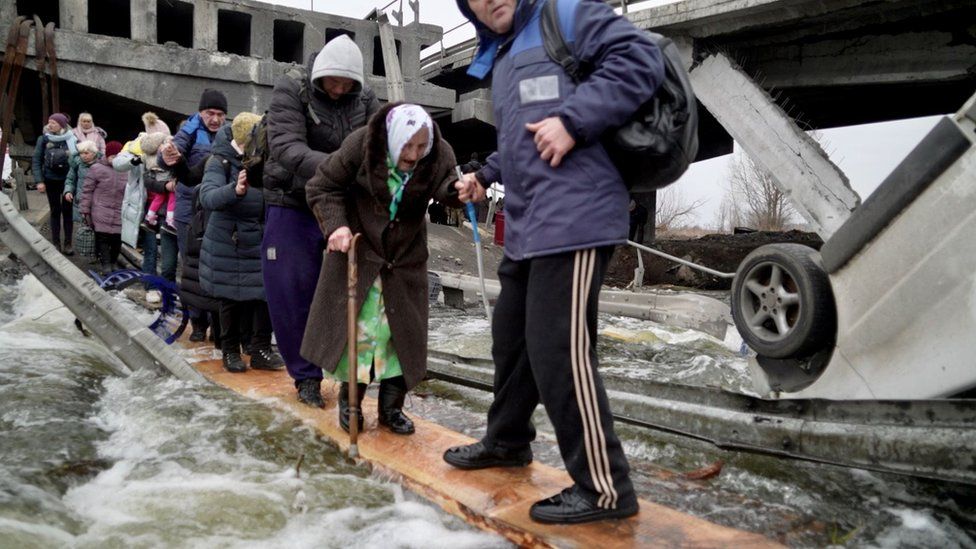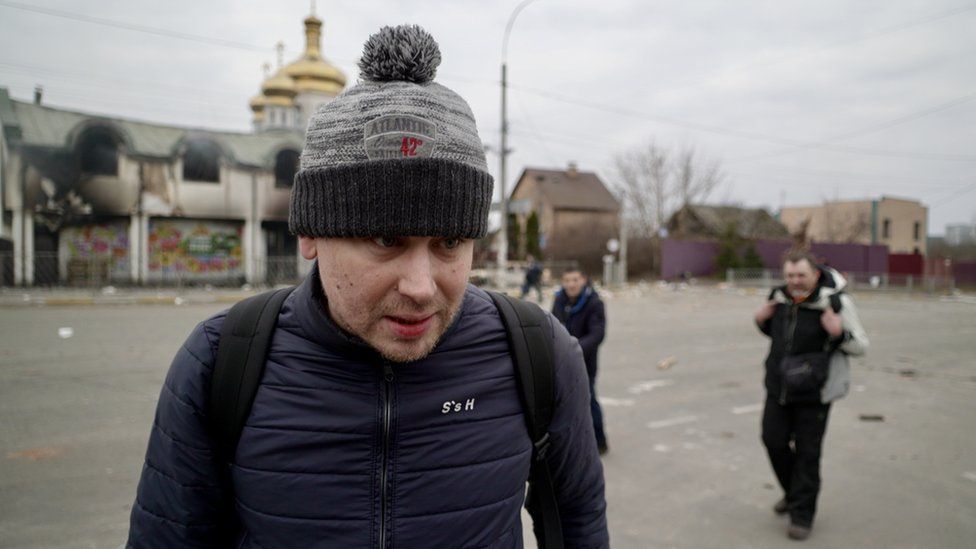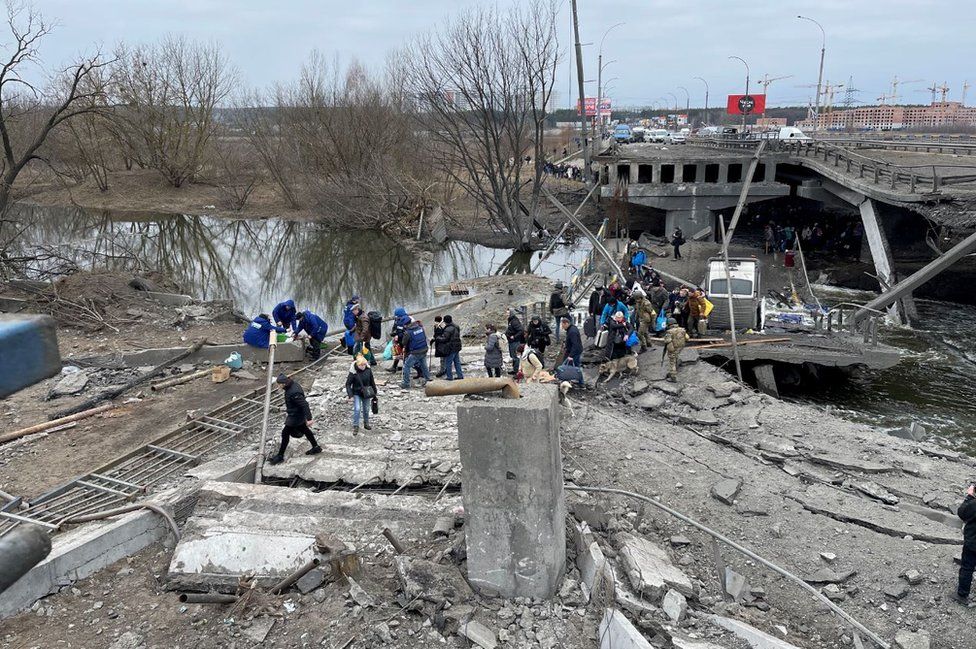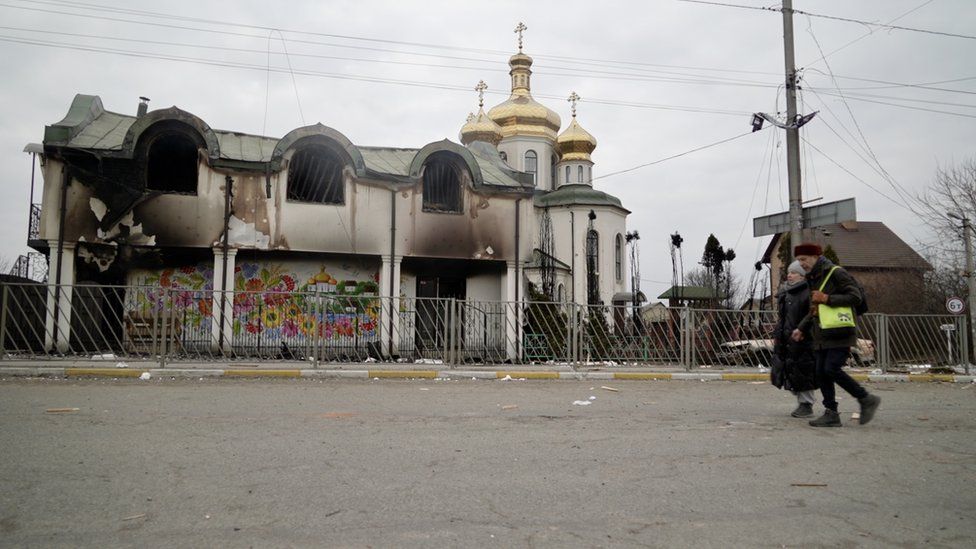War in Ukraine: 'It's hell, it's really hell' - Families flee bombs in Irpin
 Image source, Orla Guerin/BBC
Image source, Orla Guerin/BBCThey came on foot, in an endless stream - trying to outpace the Russian shells laying waste to their hometown. There were families with children in strollers clutching stuffed toys, young mothers with babes in arms, and the elderly moving as fast as their years would allow. Most were silent. Some were weeping. At the edge of Irpin there was urgency, panic, and anguish. It felt like we were witnessing the death of a city.
"Everything is bombed," said Valentina, as she rushed past us, fleeing her home and her life with just a single bag over her shoulder. "There are no lights," she said, "there's been no electricity, no gas, and no internet for two to three days. People are sitting in the basements and kids are sick there."
Russian forces are already inside the city.
"Part of Irpin was captured by Russian invaders but part of the city is fighting and not surrendering," said the mayor, Oleksandr Markushyn, in a video he posted on social media.
Those trying to flee are still being targeted, as the mayor himself saw yesterday. "The Russian invaders fired on our local civilians," he said. "A family died. This shell, this mine hit, and in front of my eyes two children and two adults died."
It seems clear that the Russian strategy is to terrorise the residents of Irpin into submission and empty the city - a tactic Moscow has used elsewhere from Grozny to Aleppo. The residents who remain have endured days and nights of relentless bombardment. We could hear the assault during an earlier visit on Saturday. The soundtrack was the same today, except maybe louder. And this time we could also hear grad rocket fire, and occasional gunshots.
"Tell everyone to close the skies, urgently, we need it," said Andrei as he dashed past - with his pet poodle - pleading for a no-fly zone. "Close the skies - please. It's hell, it's really hell. The Russian soldiers are bombing civilian houses. The Russians are not fighting the army. They are fighting anyone."
He knew it was time to go when the Russians arrived on his street. "We saw the armoured vehicles near our house. They passed by. Then the tank stopped and blew up a house near me. So, I think we are lucky, we are all really lucky that we are here."
 Image source, Orla Guerin/BBC
Image source, Orla Guerin/BBCThe 36-year-old is - or was - an events manager. 'I make the people laugh, with shows, concerts. But I think I have no work now in Ukraine," he said. Then he joined the crowds heading for minibuses that are screeching to and from the edge of the city, ferrying people, and pets, to the railway station in Kyiv - a lifeline for those trying to escape to western Ukraine.
Getting out of Irpin means picking your way over a mass of rubble, and jagged boulders and metal bars that now litter the bed of the Irpin river. This is the remains of a bridge blown up by Ukrainian forces to block - or at least slow - Russian armour reaching the capital. Planks of wood are balanced precariously on the wreckage. One elderly man almost tumbled from a plank into the water. Then he summoned his courage and shuffled forward. Nearby a woman lay flat on the ground on the riverbank - conscious but immobile. We were told she had fallen. No one knew how to try to move her.
 Image source, Orla Guerin/BBC
Image source, Orla Guerin/BBCAs we filmed a gunshot rang out. A Ukrainian soldier took a screaming young boy by the hand and ran with him to cover. Two others grabbed a buggy. Another helped a woman on a crutch, who was breathless with exertion.
A blackened building was still smouldering, neatly framed by the golden onion domes of the church directly behind (which appeared to be intact). This was an image of Ukraine, past and present, of war and peace.
 Image source, Orla Guerin/BBC
Image source, Orla Guerin/BBCThe country's future is painful to imagine, but it's already being sketched out in cities under bombardment from Kharkiv to Mariupol, where cold, frightened civilians cower in basements, or try to run for their lives.
And what we witnessed in Irpin could be a chronicle of the capital foretold. Kyiv lies straight down the road, about half an hour's drive away - a distance of 26km or 16 miles. That's why Irpin matters so much to both sides.
There's no doubting the fighting spirit here, and the determination to resist. But military experts say a broken bridge won't be enough to stop the Russians, and there is no doubt that they have Kyiv in their sights.



No comments